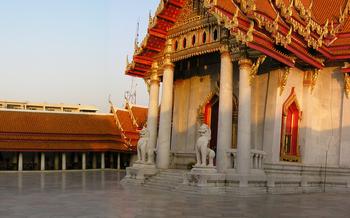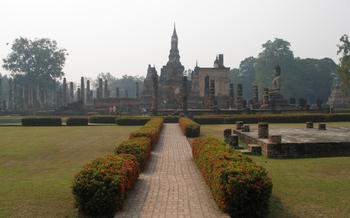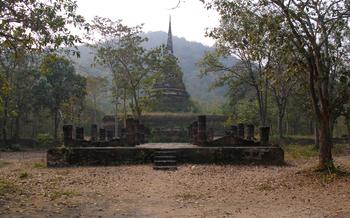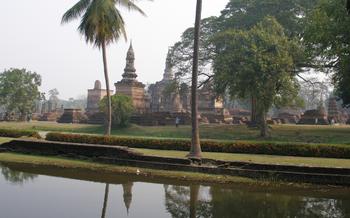
Ban Mung Meditation Retreat
- Ban Mung Meditation Retreat: A Sanctuary for Spiritual Transformation
- Retreat Schedule and Duration
- Accommodation and Facilities
- Meals and Nutrition
- Meditation Techniques Taught
- Silent Retreat Experience
- Daily Routine at the Retreat
- Group Activities and Teachings
- Mindfulness in Daily Life
- Retreat Cost and Booking Process
- Qualifications of Teachers and Guides
- Suitable Participants for the Retreat
- What to Bring and Pack
- Transportation to the Retreat
- Insider Tip: Embrace the Simplicity
Ban Mung Meditation Retreat: A Sanctuary for Spiritual Transformation
Nestled in the serene countryside of Phitsanulok, Thailand, the Ban Mung Meditation Retreat offers a tranquil haven for those seeking spiritual transformation. Established in the 1970s by a renowned meditation master, the retreat has become a renowned center for Vipassana and Metta meditation practices, attracting practitioners from around the world. Its unique setting and holistic approach create an ideal environment for deep introspection, self-discovery, and the cultivation of inner peace.
The Ban Mung Meditation Retreat holds a significant place in Thai culture, where meditation has been an integral part of religious and spiritual practices for centuries. The retreat's emphasis on mindfulness, compassion, and self-awareness aligns perfectly with the Buddhist principles that deeply influence Thai society. Visitors to the retreat have the opportunity to immerse themselves in this rich cultural heritage and experience the transformative power of meditation in a truly authentic setting.
Retreat Schedule and Duration
The Ban Mung Meditation Retreat offers various programs of different durations, catering to different needs and levels of experience. The most common retreat duration is 10 days, which provides a comprehensive immersion into the practice of meditation. During this period, participants follow a structured daily schedule that includes guided meditation sessions, teachings on meditation techniques, group discussions, and periods for self-reflection and journaling.
The daily schedule typically begins with an early morning wake-up call, followed by a morning meditation session. Throughout the day, there are several guided meditation sessions, interspersed with periods for self-study, relaxation, and mindful activities. The retreat also includes daily Dharma talks and group discussions, where participants can share their experiences and insights.
The retreat schedule is designed to provide a balance between structured activities and personal time, allowing participants to deepen their meditation practice while also having the space to reflect and integrate their experiences. The flexibility in retreat programs allows participants to choose the duration and intensity of their retreat based on their individual needs and preferences.
Accommodation and Facilities
At Ban Mung Meditation Retreat, the accommodation is designed to support a simple and focused retreat experience. The meditation huts are rustic and basic, providing a serene environment for self-reflection and contemplation. Each hut is equipped with a simple sleeping mat, a mosquito net, and a few basic amenities to ensure a comfortable stay. The retreat also offers shared bathroom facilities, maintaining a sense of community and simplicity.
The retreat's facilities are intentionally minimal, promoting a deep connection with nature and the present moment. There is no electricity or Wi-Fi in the huts, encouraging participants to disconnect from distractions and fully immerse themselves in the retreat experience. The retreat grounds offer serene walking paths, tranquil gardens, and quiet spaces for meditation and contemplation. The overall atmosphere is one of simplicity, rustic charm, and a deep sense of peace.
Meals and Nutrition
At the Ban Mung Meditation Retreat, the focus on wholesome nutrition complements the meditative practices, emphasizing the importance of mindful eating. The retreat offers a vegetarian and vegan-friendly menu, ensuring that all participants can enjoy a variety of healthy and delicious meals. Fresh, locally sourced ingredients form the foundation of the culinary offerings, providing a balanced and nutritious diet that supports the physical and mental well-being of the retreat participants.
The meals are prepared with care and attention to detail, honoring the Buddhist principle of ahimsa (non-violence). The dishes are not only flavorful but also visually appealing, encouraging participants to savor each bite with gratitude and mindfulness. Through mindful eating practices, participants learn to cultivate a deeper connection with their bodies and the food they consume.
The retreat encourages participants to adopt a mindful approach to eating, savoring each bite with full attention and appreciation. This practice helps cultivate a deeper connection with the food, the body, and the present moment.
Meditation Techniques Taught
At the Ban Mung Meditation Retreat, participants are introduced to a variety of meditation techniques that promote inner peace and self-discovery. Vipassana meditation, also known as mindfulness of breathing, forms the core of the retreat's teachings. This technique involves focusing on the natural flow of breath, cultivating awareness of the present moment and developing equanimity towards life's experiences.
Metta meditation, or loving-kindness meditation, is another integral part of the retreat. Practitioners learn to cultivate feelings of love, compassion, and kindness towards themselves and others, fostering a sense of interconnectedness and reducing negative emotions.
In addition to these core techniques, guided meditation sessions are offered, providing participants with a structured approach to meditation and allowing them to explore different themes and practices. These sessions may include body scan meditations, visualization exercises, and contemplation on various aspects of the Buddha's teachings.
Silent Retreat Experience
At Ban Mung Meditation Retreat, silence is observed as a powerful tool for deepening the meditative experience. Participants are encouraged to maintain silence throughout the retreat, except during designated periods for group discussions and teachings. This practice of silence allows for a deeper connection with the inner self and reduces distractions that may hinder the meditative process.
Initially, maintaining silence can be challenging, especially for those accustomed to constant communication and external stimulation. However, as the retreat progresses, participants often find that the silence becomes a source of peace and tranquility. It allows them to turn inward, observe their thoughts and emotions without judgment, and experience a profound sense of stillness and presence.
The silent retreat experience at Ban Mung is designed to facilitate a deeper connection with the teachings and practices of meditation. By eliminating verbal communication, participants can focus more fully on their inner experiences, develop their concentration, and cultivate a more mindful and compassionate state of being.
Daily Routine at the Retreat
The daily routine at the Ban Mung Meditation Retreat is designed to foster a deep sense of mindfulness and inner peace. The day begins with an early morning wake-up call, typically around 5:30 AM, followed by a period of silent meditation. This initial meditation session sets the tone for the day, allowing participants to center themselves and cultivate a sense of calm and focus.
Throughout the day, there are regular meditation sessions interspersed with periods of self-reflection and journaling. The meditation sessions are guided by experienced teachers who provide instruction on various techniques, including Vipassana and Metta meditation. The self-reflection and journaling periods offer an opportunity for participants to explore their inner thoughts and emotions, and to track their progress on the path of meditation.
In the evenings, there may be group activities such as Dharma talks, group discussions, or chanting sessions. These activities provide an opportunity for participants to come together, share their experiences, and deepen their understanding of Buddhist teachings. The day concludes with a final meditation session, followed by a period of silence until the next morning.
Group Activities and Teachings
Ban Mung Meditation Retreat fosters a sense of community among its participants, creating a supportive environment for spiritual growth and transformation. Dharma talks and teachings, led by experienced meditation teachers, provide insights into the principles and practices of meditation. These teachings often explore the nature of the mind, the causes of suffering, and the path to liberation.
Group discussions and sharing experiences are integral to the retreat experience. Participants have the opportunity to share their insights, challenges, and realizations, creating a collective space for learning and growth. These discussions help deepen the understanding of meditation and foster a sense of connection and support among the participants.
The retreat also organizes group meditation sessions, where participants come together to practice in a shared space. These sessions offer an opportunity to cultivate mindfulness, connect with the collective energy, and deepen the meditative experience. Through these group activities and teachings, the retreat creates a supportive environment that facilitates the exploration of the inner landscape and the cultivation of a peaceful and compassionate heart.
Mindfulness in Daily Life
The Ban Mung Meditation Retreat emphasizes the integration of meditation practices into daily life. The retreat teaches participants to cultivate mindfulness and awareness in every moment, not just during formal meditation sessions. This involves paying attention to the present moment, observing thoughts and emotions without judgment, and responding to situations with kindness and compassion.
By practicing mindfulness in daily life, participants can enhance their overall well-being, reduce stress and anxiety, and improve their relationships with themselves and others. They can learn to bring the same level of presence and awareness they cultivate during meditation into their daily activities, such as eating, walking, or interacting with others. This practice helps them to live more intentionally and mindfully, leading to a greater sense of peace, contentment, and happiness.
Retreat Cost and Booking Process
The Ban Mung Meditation Retreat offers a comprehensive retreat experience at an affordable price. The cost typically includes accommodation, meals, and all meditation teachings and activities. Advance booking is recommended to secure a spot, especially during peak seasons. Payment can be made through various methods, such as online platforms or direct bank transfers. It is advisable to inquire about any additional costs or expenses not covered in the retreat fee.
Qualifications of Teachers and Guides
The teachers and guides at Ban Mung Meditation Retreat are highly experienced and knowledgeable in the field of meditation and mindfulness. They have undergone extensive training and have a deep understanding of the teachings and practices of the retreat. Their lineage can be traced back to renowned meditation masters in Thailand, ensuring the authenticity and integrity of the teachings.
The teachers are dedicated to creating a safe and supportive environment for participants, fostering an atmosphere conducive to self-discovery and spiritual growth. They are compassionate and patient, providing guidance and support to each individual according to their needs. Their expertise and presence contribute significantly to the transformative experience of the retreat.
Suitable Participants for the Retreat
The Ban Mung Meditation Retreat welcomes individuals who are genuinely interested in exploring meditation and embarking on a journey of self-discovery. Participants should possess an open mind and a willingness to embrace a simple lifestyle during their stay. It is essential to approach the retreat with a commitment to learning and growing, setting aside any expectations or preconceived notions.
A basic level of physical and mental health is necessary to fully benefit from the retreat's activities. It is advisable for individuals with any ongoing health concerns to consult with their physician before participating. The retreat environment is not suitable for those seeking a luxurious or indulgent experience. Instead, it provides an opportunity for participants to focus on their inner journey, free from distractions and external influences.
What to Bring and Pack
When packing for your retreat at Ban Mung, it's essential to prioritize items that support your meditation practice and contribute to the overall atmosphere of simplicity and mindfulness.
Essential Items for the Retreat:
- Comfortable Clothing: Pack loose, breathable clothing suitable for meditation and daily activities. Natural fibers like cotton and linen are ideal for comfort and ease of movement.
- Meditation Cushion or Mat: If you have a preferred meditation cushion or mat, bring it along to enhance your comfort during meditation sessions.
- Shawl or Blanket: Evenings can be cool, so pack a shawl or blanket to keep warm during outdoor meditation or relaxation.
- Water Bottle: Staying hydrated is crucial, so bring a reusable water bottle to keep yourself refreshed throughout the day.
- Journal and Pen: A journal is a valuable tool for self-reflection and recording your experiences during the retreat.
- Flashlight or Headlamp: The retreat emphasizes simplicity, and artificial lighting is kept to a minimum. A flashlight or headlamp is helpful for navigating at night.
- Personal Toiletries: Pack only essential toiletries, such as a toothbrush, toothpaste, biodegradable soap, and shampoo.
- Medications: If you require any prescription medications, ensure you have an adequate supply for the duration of your stay.
Clothing Appropriate for Meditation:
- Loose and Comfortable: Opt for clothing that allows for freedom of movement and doesn't restrict your breathing during meditation.
- Natural Fibers: Choose natural fibers like cotton or linen that are breathable and gentle on the skin.
- Neutral Colors: Avoid bright colors or patterns that may be distracting during meditation. Neutral tones promote a sense of calmness and focus.
Personal Toiletries and Medications:
- Biodegradable Products: The retreat emphasizes sustainability, so consider bringing biodegradable toiletries to minimize your environmental impact.
- Minimal Packing: Pack only the essentials to avoid cluttering your space and maintain the retreat's simple lifestyle.
- Prescription Medications: Ensure you have an adequate supply of any prescription medications you require, as access to medical facilities may be limited.
Transportation to the Retreat
Ban Mung Meditation Retreat is situated in a tranquil countryside setting, approximately 20 kilometers from Phitsanulok city. The retreat's secluded location adds to its serene atmosphere and provides an ideal environment for meditation and self-discovery.
Reaching the retreat is relatively straightforward. If you're coming from Bangkok or other major cities in Thailand, you can take a bus or train to Phitsanulok. From there, you can hire a private vehicle or taxi to take you to the retreat. The journey from Phitsanulok city takes about 30-45 minutes by car.
For those who prefer public transportation, there are local buses that run from Phitsanulok to the nearby village of Ban Mung. From the village, you can take a short walk or hire a local tuk-tuk to reach the retreat.
Insider tip: Consider arriving at the retreat a day or two before your scheduled start date to allow yourself time to settle in and adjust to the peaceful surroundings before embarking on your meditation journey.
Insider Tip: Embrace the Simplicity
At Ban Mung Meditation Retreat, you'll have the chance to disconnect from the distractions of modern life and immerse yourself in the present moment. This digital detox will allow you to focus on your inner journey and cultivate a deeper connection with yourself. Embrace the opportunity for deep introspection and self-discovery that this retreat offers. Let go of the need to constantly be connected and allow yourself to be fully present in the serene and tranquil environment of the retreat. This will enhance your meditative experience and help you cultivate a lasting sense of peace and well-being.




